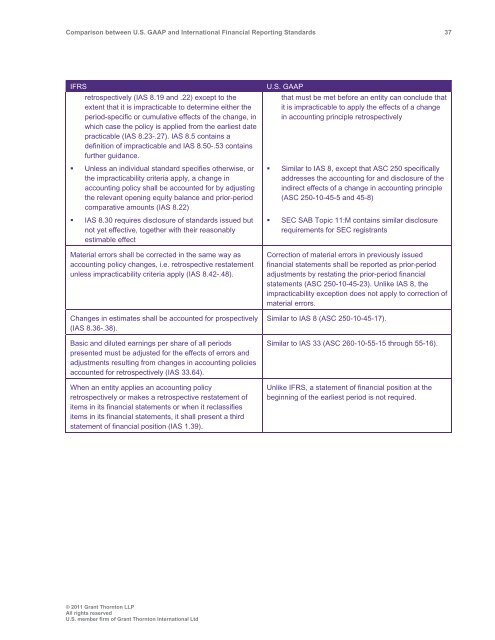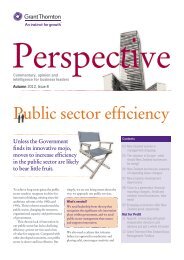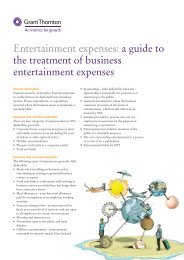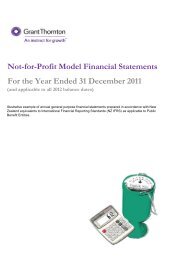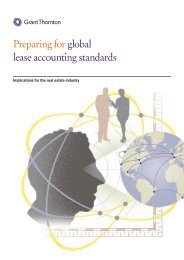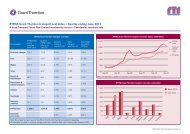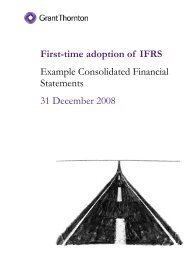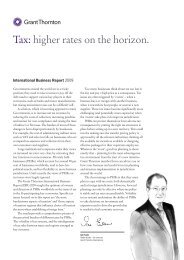Comparison between U.S. GAAP and International ... - Grant Thornton
Comparison between U.S. GAAP and International ... - Grant Thornton
Comparison between U.S. GAAP and International ... - Grant Thornton
Create successful ePaper yourself
Turn your PDF publications into a flip-book with our unique Google optimized e-Paper software.
<strong>Comparison</strong> <strong>between</strong> U.S. <strong>GAAP</strong> <strong>and</strong> <strong>International</strong> Financial Reporting St<strong>and</strong>ards 37<br />
IFRS<br />
retrospectively (IAS 8.19 <strong>and</strong> .22) except to the<br />
extent that it is impracticable to determine either the<br />
period-specific or cumulative effects of the change, in<br />
which case the policy is applied from the earliest date<br />
practicable (IAS 8.23-.27). IAS 8.5 contains a<br />
definition of impracticable <strong>and</strong> IAS 8.50-.53 contains<br />
further guidance.<br />
• Unless an individual st<strong>and</strong>ard specifies otherwise, or<br />
the impracticability criteria apply, a change in<br />
accounting policy shall be accounted for by adjusting<br />
the relevant opening equity balance <strong>and</strong> prior-period<br />
comparative amounts (IAS 8.22)<br />
• IAS 8.30 requires disclosure of st<strong>and</strong>ards issued but<br />
not yet effective, together with their reasonably<br />
estimable effect<br />
Material errors shall be corrected in the same way as<br />
accounting policy changes, i.e. retrospective restatement<br />
unless impracticability criteria apply (IAS 8.42-.48).<br />
Changes in estimates shall be accounted for prospectively<br />
(IAS 8.36-.38).<br />
Basic <strong>and</strong> diluted earnings per share of all periods<br />
presented must be adjusted for the effects of errors <strong>and</strong><br />
adjustments resulting from changes in accounting policies<br />
accounted for retrospectively (IAS 33.64).<br />
When an entity applies an accounting policy<br />
retrospectively or makes a retrospective restatement of<br />
items in its financial statements or when it reclassifies<br />
items in its financial statements, it shall present a third<br />
statement of financial position (IAS 1.39).<br />
U.S. <strong>GAAP</strong><br />
that must be met before an entity can conclude that<br />
it is impracticable to apply the effects of a change<br />
in accounting principle retrospectively<br />
• Similar to IAS 8, except that ASC 250 specifically<br />
addresses the accounting for <strong>and</strong> disclosure of the<br />
indirect effects of a change in accounting principle<br />
(ASC 250-10-45-5 <strong>and</strong> 45-8)<br />
• SEC SAB Topic 11:M contains similar disclosure<br />
requirements for SEC registrants<br />
Correction of material errors in previously issued<br />
financial statements shall be reported as prior-period<br />
adjustments by restating the prior-period financial<br />
statements (ASC 250-10-45-23). Unlike IAS 8, the<br />
impracticability exception does not apply to correction of<br />
material errors.<br />
Similar to IAS 8 (ASC 250-10-45-17).<br />
Similar to IAS 33 (ASC 260-10-55-15 through 55-16).<br />
Unlike IFRS, a statement of financial position at the<br />
beginning of the earliest period is not required.<br />
© 2011 <strong>Grant</strong> <strong>Thornton</strong> LLP<br />
All rights reserved<br />
U.S. member firm of <strong>Grant</strong> <strong>Thornton</strong> <strong>International</strong> Ltd


